Does President Trump's latest tweet storm matter?
There's very little that is considered shocking or surprising in the age of Trump.
But in 140 characters on Twitter, the president sent a message which many felt had crossed the line of acceptable political discourse.
In a tweet directed at US news anchor Mika Brzezinski, the president denigrated her appearance - "she was bleeding badly from a face-lift!" he wrote.
Politicians and commentators across the spectrum were quick to condemn his excoriating language, arguing it wasn't befitting of the holder of the highest office.
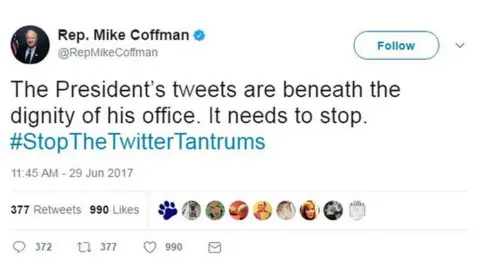
And to many, there was a recurring subtext to the tweet - sexism towards women in the public eye.
"This is not okay. As a female in politics I am often criticised for my looks. We should be working to empower women," wrote Republican congresswoman Lynne Jenkins.
Empowering women means respecting them, and for many critics of the president, this tweet and his previous attacks on women do the opposite and objectify.
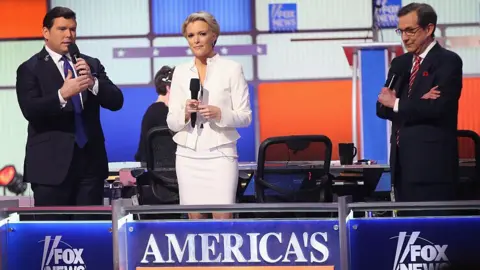 Getty Images
Getty ImagesThey point to his longstanding feud with actress Rosie O'Donnell, whom he termed as "crude, rude, obnoxious and dumb".
And there was his attack on news anchor Megyn Kelly - "there was blood coming out of her wherever", plus his insults directed at former Republican presidential hopeful Carly Fiorina, with "look at that face".
Last year when the infamous Access Hollywood tapes were released when he was a candidate, President Trump dismissed his degrading remarks about women as "locker room banter" pointing out that he'd uttered them more than a decade ago.
But now - as president - the same tone continues.
His critics wonder how this sort of language can be explained to young children, and say he's setting a dangerous example.
"When leaders are bullies, it's an implicit license to others - sexual harassers, white supremacists, Islamophobes - to spread their hate," tweeted Democratic congresswoman Barbara Lee.
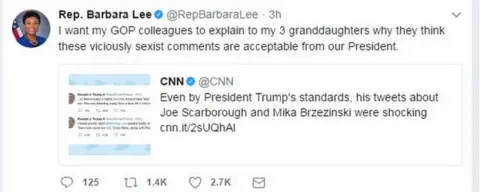
During the election Donald Trump often taunted female reporters who covered him, which in turn encouraged a small section of his supporters to follow suit.
The most high-profile example of this was NBC's Katy Tur, who was dubbed "Little Katy" and "third rate" by Mr Trump, who said her tweets were lies.
It led to her having secret service protection, for fear of attacks.
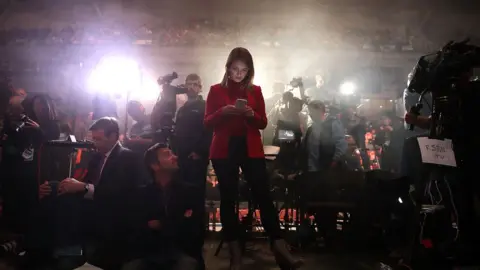 Chip Somodevilla
Chip SomodevillaIt wasn't just Katy Tur. Other reporters, myself included, have been at the receiving end of online abuse, when covering Mr Trump. Some of his supporters have sent me racist and sexist messages, calling me everything from a "whore" and a "bitch", to a "terrorist" and a "tea girl".
And while men are targeted too, women bear the brunt of it when it comes to remarks about appearance, and judgements about intellect.
This has been a trend which pre-dates President Trump's time in office, but Soraya Chemaly, the director at the Women Media Center's Speech Project, argues the president's language legitimises this behaviour.
"It falls into a pattern of him displaying a disgust for women and their bodies. This kind of examination of women is pretty standard in our culture - public commentary on women and the way they look fuels major sectors of the economy, so there's really nothing that will stop the president," she says.
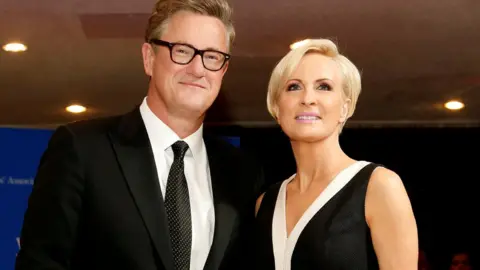 Reuters
ReutersSome Twitter users wonder if the president's latest rant falls foul of the website's guidelines, which stipulate you must not incite or engage in the targeted abuse or harassment of others.
A number have even reported the president's tweet. "If he were an average citizen and he did that he'd clearly be in violation," argues Soraya Chemaly. But it's unlikely that as president his account would be suspended.

What this episode also shows us is just how divided the country is, not just on the president, but on the issue of sexism.
President Trump won with white female voters last November, despite his degrading comments towards women.
When I covered the campaign I met many of them who argued his comments were nothing worse than the sort of thing women say about men, on a bachelorette party or a night out.
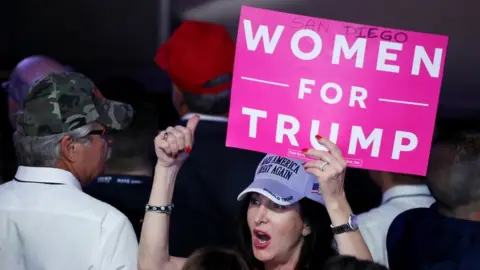 Getty Images
Getty ImagesAs for this latest tweet - well, all the female Trump voters I messaged said they hadn't even seen it, let alone heard of Mika Brzezinski.
To them, this was another example of the media fixating on itself, rather than the work of the president.
"I have a big problem with the press," Cathy told me. "The dignity of the presidency is everyone's responsibility."
Cathy wasn't offended by the Mika tweet when I read it to her. She and many Trump voters argue the conversation is focused on all the wrong things - tweets not policy.
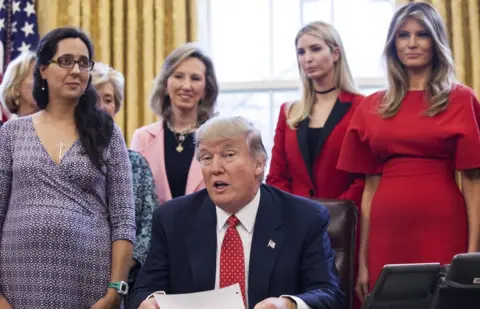 Zach Gibson
Zach GibsonBut there's no denying the president himself is fuelling that fire with his daily online missives.
One Trump voter, Jan, told me she thinks the president is sexist, ill-mannered, a narcissist, and wants him to quit the tweeting.
But even with that less-than-flattering description, she's still behind the president. And that's why none of these tweet storms have made much of a difference, so far.
